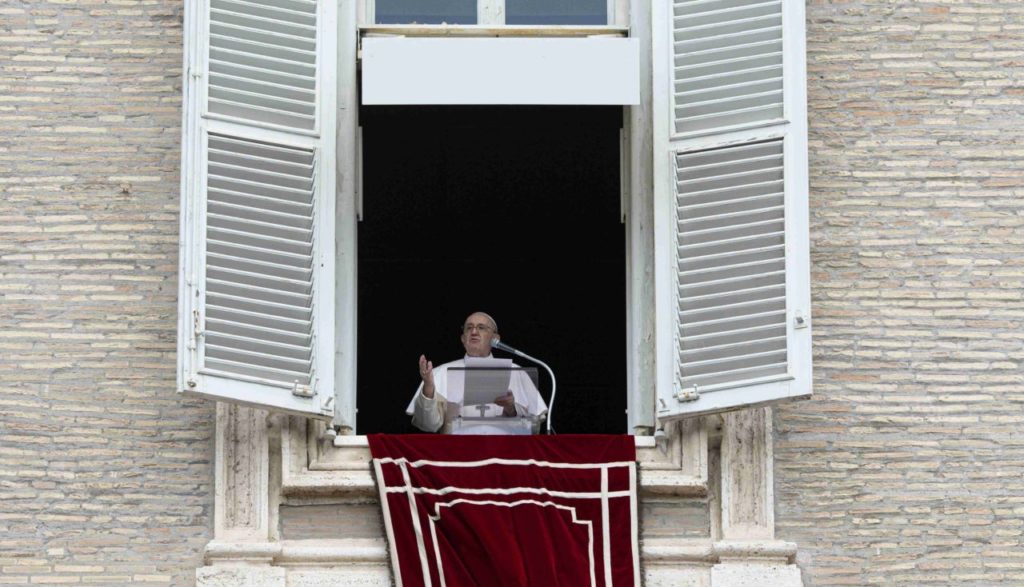Pope Francis, on this Sunday, the Solemnity of the Assumption of the Blessed Virgin Mary into Heaven, dwelt on the Magnificat, which highlights the Gospel passage of the Mass. "This song of praise," he began after praying the Angelus while leaning out of the window in St. Peter's Square, "is like a 'photograph' of the Mother of God. Mary 'rejoices in God, because she has looked upon the humility of his servant' (cf. Lc 1,47-48)".
"Humility is Mary's secret," the Pope emphasized. "It is humility that attracted God's gaze to her. The human eye seeks greatness and is dazzled by what is ostentatious. God, on the other hand, does not look at appearances, but at the heart (cf. 1 Sam 16:7) and loves humility. Today, looking at Mary Assunta, we can say that humility is the way that leads to Heaven. The word "humility" comes from the Latin word "humildad". humuswhich means "earth". It is paradoxical: to reach the heights, Heaven, it is necessary to remain low, like the earth. Jesus teaches: "He who humbles himself will be exalted" (Lc 14,11). God does not exalt us by our gifts, riches or abilities, but by humility. God raises up those who humble themselves, those who serve. In fact, Mary does not ascribe to herself anything other than the "title" of servant: she is "the handmaid of the Lord" (Lc 1,38). She says nothing more about herself, she seeks nothing more for herself.
"So," he continued, "today we can ask ourselves: how is my humility? Do I seek to be recognized by others, to assert myself and be praised, or do I think about serving? Do I know how to listen, like Mary, or do I just want to talk and receive attention? Do I know how to be silent, like Mary, or am I always chattering? Do I know how to take a step back, defuse fights and arguments, or am I just trying to stand out?"
"Mary, in her littleness, first conquers the heavens. The secret of her success lies precisely in recognizing herself as small, needy. With God, only he who recognizes himself as nothing is capable of receiving everything. Only he who empties himself is filled by Him. And Mary is "full of grace" (v. 28) precisely because of her humility. For us too, humility is the starting point, the beginning of our faith. It is essential to be poor in spirit, that is, in need of God. He who is full of himself gives no room to God, but he who remains humble enables the Lord to accomplish great things (cf. v. 49)".
Alluding to classical Italian literature, the Pope commented that "the poet Dante refers to the Virgin Mary as "humble and higher than a creature" (Paradise XXXIII, 2). It is beautiful to think that the most humble and elevated creature in history, the first to conquer the heavens with her whole being, body and soul, spent her life mostly indoors, in the ordinary. The days of the Full of Grace were not very impressive. They often followed one another just the same, in silence: outwardly, nothing extraordinary. But the gaze of God always remained upon her, admiring her humility, her availability, the beauty of her heart, never touched by sin".
"This is a great message of hope for us; for you, who live the same exhausting and often difficult journeys. Mary reminds you today that God also calls you to this destiny of glory. These are not pretty words. It is not a contrived happy ending, a pious illusion or a false consolation. No, it is pure reality, living and true as the Virgin Assumed into Heaven. Let us celebrate her today with the love of children, animated by the hope of one day being with her in Heaven".
Finally, Francis concluded by saying that now "let us pray to her, so that she may accompany us on the road that leads from Earth to Heaven. May she remind us that the secret of the journey is contained in the word humility. And that littleness and service are the secrets to reach the goal".







